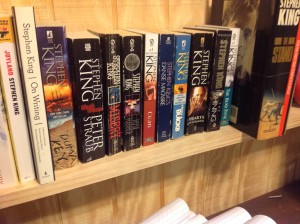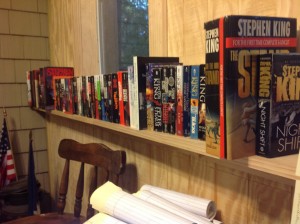The plan is to reread all of Stephen King’s novels. Richard Chizmar of Cemetery Dance has a financial stake in this challenge. It is still not a terrible idea. I’m doing it because I am a writer and I want to improve my long fiction. I think there are secrets to be discovered or rediscovered in it too. As Chizmar posts his after read posts and Bev Vincent posts his accompanying history, I will add links to those in my corresponding posts.
Here is the link the Master List of all my #StephenKingRevisited posts.
A guest post offered by Michael Koryta
Much of what I write in these posts will really be notes for me. I will wordsmith them into a blog that appears to be for you. I will also style my comments to be spoiler free for those that haven’t read, but that also work for those that have read the books. Be warned though that I am discussing the content of the book and the writing.
This is my Before The Shining post.
The Shining opens on a conflict. It is a small one. Again Stephen King uses two characters with slightly different agendas and motivations to interesting effect. In this small conflict, we get character, motivation, setting, history, and all of this is revealed gradually. Later, King will describe a key moment from two different characters’ perspective. The tone of the narrative shifts with the perspective characters in each section too.
There are hints of the danger in Jack’s history. His problems are more than just a single incident. King complains that the movie plays Jack too crazy too soon. It seems to be here early in the book too. The debate club ending in disaster is no small part of that. The boiler, of course, plays as a powerful metaphor through the novel.
It is interesting that the story talked about quitting before there was talk of the build up of the habit itself.
The roque court is used to create a moment of separation and will be pivotal at other points in the novel as well. It is just odd enough to be familiar, but not. It is a division in class and history as well.
The rats in the attic and the fighting couple heard through the ceiling serve as hints of trouble chewing at the edges and problems upstairs.
Danny is called Doc. It is interesting looking back on this with the existence of a sequel that was certainly not in the works when this novel was originally published.
The discussion of “shit” is powerfully done. It is vulgar. Nice people don’t say it. Danny points out that Daddy says it. This hits a little hard on me as a parent. Hurting or letting down my sons haunts me – more and more every day. King touches a kind of horror fathers understand. Danny tries to navigate the motives of adults. They seem dangerous and animal random. Children are jerked about like puppets. The horror of parents and what children understand is delivered masterfully. Dreams of losing Danny in the hotel punctuate this. The telepathic element is introduced on the back of what kids “sense” about their parents and the world. In this context, the shine is more than just a convenient plot element. It represents something more important to character, family, life, and story. Adult concepts like divorce and suicide are like psychic invasions on children’s minds.
The doctor and discussion of men in white coats plays heavy on Danny. Losing his marbles and being unable to stop crying is a heartbreaking fear the way King presents it. There is a great, subtle callback to this at the end that offers Danny an opportunity to be set free of this that I think might be lost on many readers. Well placed though, I think.
Marriage is discussed as a lopsided defeat. That is a good line. It serves the story well. I would not suggest using it yourself.
In the book, the wife is a substantial character. I think some of that is lost in the movie version. The book is a better story for this version of the character. Teaching the boy to read is full of strong stuff. The mother and boy growing up together in different ways is well done. There is a moment where Jack turns the situation back on the mother and makes her feel what Jack has been going through for years.
The use of the racial slurs around the character of Hallorann are delivered with a heavy hand in both the narration and the dialogue. This is not to say they are poorly done. Also, King touches on the prejudice around homosexuality again in this book. There are references to fairies and one character going on about “homosechils.” The racism discussed around Hallorann is almost casual in its sharpness. He is also an example of the prototypical magic black man that so many stories have copied over the years.
King indulges in long, flowing paragraphs at times. They are well done, but not seen much anymore in fiction.
The scene in the phone booth was an interesting character moment and a moment out of time. If we were writing a phone booth in a scene in a story set in the 70’s instead of written during the 70’s I think it would be written in more of a tongue-in-cheek fashion that would make it weaker than what happened naturally in this story. The papers that talk about Johnson and the Kennedy assassination touch on these type of moments too. Microfilm technology in the library is detailed. He mentions the rugby players lost in the mountains and having to turn to cannibalism to survive. A flight is booked and the person hops on to go in less than 30 minutes. Those were the days. Smoking on planes was still in effect then too.
There is an uneasiness in introducing the elevator that I particularly liked.
King has a moment when they could have made a different choice. That chance to have escaped is important. It plays well with a moment of partial redemption for one of the characters later. There is a moment where the hint of danger returns late and a different, dark choice can be made by a character. That moment plays well as a mirror image of the above missed opportunity. Another escape opportunity is passed over. It is realistic, complicated, and the road becomes a symbol of the conversation
The ledgers in the basement become a big telling instead of showing moment as “they” say. I’m not sure how else this information could be delivered in that moment though. Newspaper clippings in the scrapbook do the same thing.
Poe is called America’s hack and a half-assed transcendentialist.
There is a discussion of the fear of a child having autism that I found interesting in the context of the time period and modern times.
“I haven’t even gotten around to murdering my wife yet. I’ll save that for after the holidays when things get boring.” Insane dropped in line that is just left there for the reader to swallow in the middle of the novel. Later, a sudden thought of violence enters again, but we are prepared for it through the moments in the novel.
Jack’s trick with Excedrin reads as kind of personal to the writer.
Jack is locked into limits by the hotel’s isolation, the phone calls he has to make, the conditions placed on him, the imagery of the dog collar, and the limits on his writing.
The hedge scenes and the bathroom scene are ones that hung heavy on King. He has talked about writing them more than once over the years. I felt the anticipation of them coming up in my rereading too. The playground traps for Danny are well written too. He wrote the scene where a character fears a hand putting their hand over a light switch and then being afraid to turn it on. This is a fear he has brought up in interviews before.
“Tell the truth and save a lie.” Good line and well used in this story.
“Let this cup pass from me” is used in this story and will come up in an important way in The Stand as well.
Jack’s violence is stalled for a moment that keeps the tension going. King plays the story out to the end making us think we know what will happen, but still delivering surprises.
Next on the list is Rage. Follow along as I continue. Here is my Before Rage post.
I’ll keep you posted,
#StephenKingRevisited
– Jay Wilburn, writer







2 comments